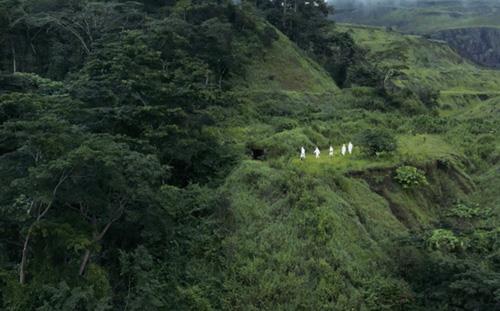
The horse has bolted the barn where COVID-19 is concerned but, even so, National Geographic Channel's Virus Hunters, premiering tonight (9 p.m. ET), is an eye-opening look at the day-to-day travails of virus researchers as they scour some of the planet's most remote, unreachable regions to find viruses before they get loose.
Virus Hunters is a shorter, sharper, pithier version of Netflix's exhaustive — and much better — docuseries Pandemic: How to Prevent an Outbreak, but then not all viewers can spare the six hours it takes to get through Pandemic from beginning to end. Virus Hunters clocks in at just under an hour and, despite the usual annoying — and artificial — background music, it's still worth watching. Too many documentaries today use this loud, relentless background music, cobbled together from machine-learning algorithms and not an actual composer, but every so often, the subject matter is important enough that in-your-face music is a minor irritant only.
The opening moments of Virus Hunters find ABC News foreign correspondent James Longman in Liberia in the hot, humid rainforest belt of West Africa notorious for nearly every tropical disease known to science. They're called hot spots, Longman tells us, using a smartphone conversation as a kind of storytelling device. The point about hot spots is that they're places where viruses have emerged before "and will likely emerge again." (The person on the other end of the phone knows this, of course, but this is the filmmakers' way of filling in the blanks for the audience watching at home.)
These pandemics are becoming a greater risk, we're told, and more outbreaks are happening. As bad as COVID-19 is — and this is going to be a long, hard winter, even for those families across North America not yet affected by the virus — what really worries the scientists is the next one. The next one may not be as easy to fix as COVID….
Just one example: The polar ice is melting and, with it, countless unknown viruses that have remained dormant dating back to a time before the last Ice Age. Recent news reports suggest vast quantities of methane are about to be released into the atmosphere over Siberia as the permafrost melts, and what lies below that methane may well be the stuff of Hollywood science-fiction movies.
National Geographic field explorer and ecologist Chris Golden is the program's host, guide, and seeing eye. When asked, early on, how scientists could possibly have missed COVID-19, Golden opts for a diplomatic reply: We hadn't done a good enough job of preparing for this event.
He's being kind. Science writer David Quammen predicted as much in his well-received 2012 book Spillover: Animal Infections and the Next Human Pandemic, and the truth is that scientists knew what was going to happen and said so, but those in power — those whose job it is to protect American citizens from pending disasters — didn't listen.
"It could be seen as a war," Golden says in the program, somberly, "and right now, it is a war that we're losing."
Cue the cheap You're-Too-Dumb-To-Get-It-On-Your-Own background music, but the point is clear: The COVID coronavirus outbreak was just a wake-up call. Something more lethal and contagious is still out there. The virus hunters' mission is to find these new viruses before they start and somehow find a way to stop them before they get into the population.
That's easier said than done today because — until COVID-19 lockdowns threw a wrecking ball through international airline travel — we're living in an age where one can travel literally halfway around the world in just over 24 hours. A typical trans-Atlantic flight can carry 300-350 passengers at a time. That's 300-350 potential spreaders of an unknown pathogen that, as COVID-19 is teaching us, can be awfully difficult to put back into the bottle once it escapes.
"It's definitely unnerving to travel during coronavirus," Golden says, arriving in Liberia and submitting to a COVID test on arrival, conducted by a medic in a full-on Hazmat suit, complete with a face shield and full-body protective gear. From there, Golden travels into the jungle, looking for the places where viruses begin their journey. Liberia was ground zero in the 2014-'15 Ebola outbreak, a hemorrhagic fever caused by a zoonotic virus (a virus that spreads from animals to people) that killed some 12,000 people. Ebola is not COVID — far from — but COVID is also believed to have originated from an animal, believed to be a bat, though it could have been something else.
As of Sept. 30, researchers say COVID-19 has now killed more than a million people worldwide. Ebola was frightening, but COVID-19 is proving far more deadly, partly because of how quickly it spread around the world.
If you have the time, by all means, track down Pandemic on Netflix. Failing that, though, Virus Hunters is a good primer.